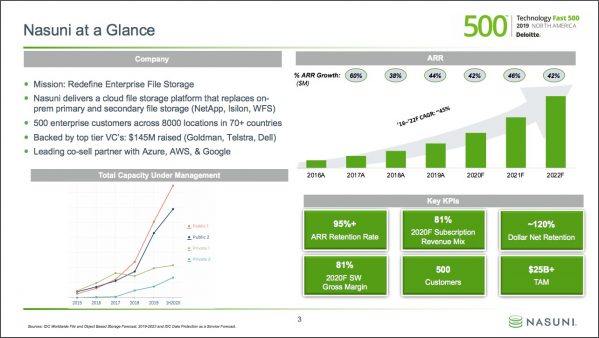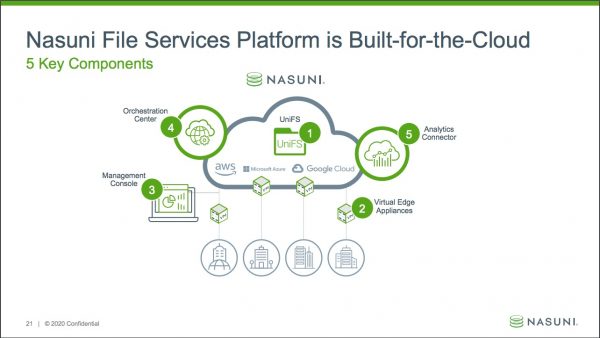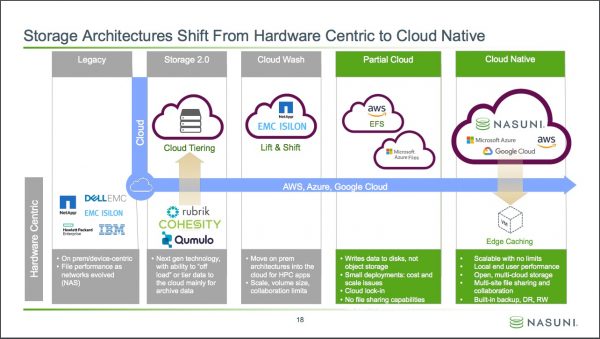Nasuni Available in Azure Marketplace
To drive application development and shape business strategies
This is a Press Release edited by StorageNewsletter.com on July 8, 2020 at 2:25 pmNasuni Corp., announced its file services platform is available for purchase in the Microsoft Azure Marketplace, an online store providing applications and services for use on Azure.
Its customers can now take advantage of the productive Azure cloud platform, with streamlined deployment and management.
Nasuni file services allow customers to accelerate their migrations to Azure with a file services platform built for the cloud. Powered by a global file system, Nasuni modernizes primary and secondary file storage by consolidating NAS and file server silos to cloud storage, delivering infinite scale. It also provides built-in backup, global file sharing, disaster recovery and local file server performance. By combining all this functionality with the economics of the Azure cloud, the firm is able to provide file services at half the cost of traditional file infrastructures.
“Nasuni helped us transition to working remotely during COVID-19 because it provides easy access to data consolidated from all 22 of our offices and ultimately stored in Microsoft Azure,” said Charles Douglass, director of information technology, McKim & Creed, Inc. “We’re accessing our data through a variety of methods, including directly from workstations, remote-control tools and remote desktops, depending on the specific application. No matter which tool we use for the job, Nasuni gives us a common backplane for easy data storage and retrieval.”
“We’ve been a very close Microsoft gold partner, and we’re pleased to further advance this great collaboration by making our solution available in the Microsoft Azure Marketplace,” said Will Hornkohl, VP of alliances, Nasuni. “It’s now even easier for enterprises who rely on Azure to use the cloud for file storage and get infinite scale, built-in-backup and local performance for half the cost of ownership of traditional on-premises NAS.”
“Through Microsoft Azure Marketplace, customers around the world can easily find, buy, and deploy partner solutions they can trust, all certified and optimized to run on Azure,” said Sajan Parihar, senior director, Microsoft Azure Platform, Microsoft Corp. “We’re happy to welcome the Nasuni file services solution to the growing Azure Marketplace ecosystem.”
The Azure Marketplace is an online market for buying and selling cloud solutions certified to run on Azure. It helps connect companies seeking innovative, cloud-based solutions with partners who have developed solutions that are ready to use.
Nasuni’s file services platform is available in Azure Marketplace.
Comments
With this Nasuni announcement, it's the time to cover the holy grail of file storage i.e global file service that so many players have tried to solve for years.
For decades there was a lot of tentatives to address the need. Different evolution and contributions to reach the current market landscape are identified:
- Geo distributed file services with Transarc, DCE DFS, Andrew File System or Coda to name a few, and even WebFS.
- Network file management/network file virtualization with Avere, Acopia, Attune, Autovirt, Neopath, Rainfinity, Nuview. Many of them got acquired or disappeared.
- CDN has also played a key role and some storage pioneers tried to leverage that model, it was the case of Storigen, Scale Eight or Acirro, all acquired.
- Cloud gateway with some players from the previous category adding S3 back-end path with Panzura, Nasuni, CTera Networks and a few others.
- WAFS, WAAS, WAN acceleration and optimization and now SD-WAN can offer some interesting models for some applications. You find here essentially network centric companies.
- Global file service and established gateway players again with Nasuni, CTera Networks, Panzura, Morro Data and NetApp.
A major change transversal to these few technologies and solutions is the cloud that appeared and gained importance since AWS introduced S3 in 2006.
A lot of players are not developing successfully a file system on top of S3 or other object storage service. The reverse is true, adding a S3 layer on top of a NAS is super common, helped by open source product like MinIO for instance.
Main challenges are the data consistency, their integrity, their propagation with the changes, the automation of the file service itself, the file presentation and globally the mandatory to deliver a single file system image. It also requires that the service is able to scale i.e with large capacity, billions of files and hundreds of sites.
Nasuni represents one of the two leaders - the other one being CTera Networks - in the global file service category. Other players are more confidential such as Panzura, with lots of promises but mysteriously acquired by Profile Capital, Morro Data, NetApp via the recent Talon Storage acquisition for SMB (the protocol not the market segment) and FlexCache for NFS or even Peer Software. We can even list here SoftNAS now Buurst, even more hidden under its new name, JuiceFS, ObjectiveFS or LucidLink. Datomia seems to hit a wall and their website disappeared. BridgeSTOR, founded by John Matze, developed also a product named Coronado but the company seems to be inactive.
Nasuni was recently elected as a storage unicorn illustrating a growth being one of the few top file storage vendors with Qumulo and VAST Data. Pure Storage could be listed here as well.

Nasuni has made some interesting design choice. They adopted a star topology meaning that the master is the cloud, the central repository being always the reference. Immediately it means there is no data divergence created by any to any type of dialogue across remote sites. As soon as data reach the central place, it is propagated.
Second, the firm relies on a log structured file system, named UniFS, on top of object storage where various file versions are kept. This is by design. UniFS means Unified File System and it works in a append only mode and every change in a file is a version. Also the number of versions is infinite. Each file is immutable stored on a durable storage back-end. Object storage could be Azure, AWS, GCP or on-prem. And Nasuni service is listed on Azure and AWS marketplace.

Edge sites are views of the central site by caching data locally. It represents the other element of the puzzle talking to the central engine via a specific Nasuni protocol. This is an other value of the product. The architecture provides a global file locks at the file level, not sub-file.
The approach has the beauty to collapse primary and secondary storage into one entity exposing storage to applications and receiving data copied in this unique storage lake.
Such solutions are judged by the cache hit ratio as it translates immediately in QoS. So LRU algorithms and derivatives are paramount here. The product doesn't protect data by itself as it relies on object storage that offers high durability level but versioning provides a sort of time addressable storage model.
The solution is priced by capacity under a subscription model. As of today, we count more than 100PB under Nasuni control and it continues to grow at a rapid pace.
Such solution targets several use cases:
- Consolidate NAS and file servers,
- Multi site file sharing and collaboration,
- Edge and ROBO,
- Cloud NAS,
- Data protection with integrated backup and DR.
Product is composed by UniFS, Edge Appliances, physical or virtual, a management console, the Orchestration Center, core element for data propagation and global file locking and the Analytics Connector.

Nasuni confirms that the global file service in their cloud-native flavor represents a new battlefield for file storage vendors and we anticipate some moves in the next few quarters as it is a real hot segment. Remember it's the holy grail for file storage.
Read also:
Nasuni Available in AWS Marketplace
Organizations can leverage cloud-based file services with consolidated billing, license management, and flexible consumption with AWS.
February 10, 2020 | Press Release














 Subscribe to our free daily newsletter
Subscribe to our free daily newsletter


